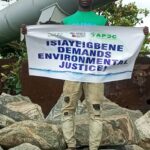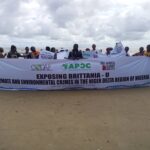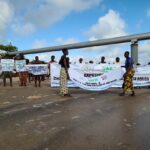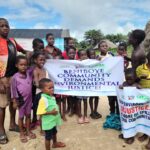Niger Delta Communities Seek Urgent Intervention Over Brittania-U’s Neglect Of Three-Month Oil Spill
· Present Case Of Environmental Harms At African People’s Counter COP
By Edu Abade
Residents of Odimodi, Beneboye and Isiayeigbene coastal communities in Iduwini Clan, Burutu Council of Delta State, have asked Brittania-U to take responsibility for the crude oil spill, which occurred on July 18, 2024, caused by a fire incident that gutted one of its vessels ferrying crude oil.



 It would be recalled that the communities had reported massive oil pollution ravaging the Forcados area, which affected the Odimodi, Beneboye, Isiayeigbene, and Okuntu communities coastline in July. Different reports from the communities affirmed that the spill was caused by a fire incident which happened on a Floating Production Storage and Offloading Facility belonging to Brittania-U Nigeria Limited at Ajakpa Field’s OML 90.
It would be recalled that the communities had reported massive oil pollution ravaging the Forcados area, which affected the Odimodi, Beneboye, Isiayeigbene, and Okuntu communities coastline in July. Different reports from the communities affirmed that the spill was caused by a fire incident which happened on a Floating Production Storage and Offloading Facility belonging to Brittania-U Nigeria Limited at Ajakpa Field’s OML 90.
Representatives of the affected communities sought urgent intervention during a People’s Assembly Action organized by the Community Development Advocacy Foundation (CODAF) as part of activities lined up for the African People’s Counter COP (APCC) supported by the Africa Climate Justice Collective (ACJC) aimed at exposing the oil spill crisis caused by Brittania-U in the areas.
Executive Director of CODAF, Richard Benin, who spoke with representatives of the communities, stated that the local and international oil companies in the Niger Delta region have continued to pollute the environment because they are aware of the inability of the communities to speak with one voice and demand accountability from the companies and the government, who are key beneficiaries of oil extraction, while residents are left to bear the brunt of degraded environments.
Benin said CODAF and other affiliate organizations in Nigeria, Africa, and the world could only act on the reports if the communities remain united to speak about their challenges and tell the world about their stories of hunger, poverty, health challenges, and neglect, despite their status as an oil-rich region.
The communities also lamented that despite the health hazards and environmental and air pollution caused by the spill, neither the company, the National Oil Spills Detection and Remediation Agency (NOSDRA), nor any government agency have visited the communities to ascertain the level of damages caused by the spill and how the fishing and farming folks have survived in the face of their degraded environment and the destruction of livelihoods.
A representative of Beneboye Community, Brotobo Agbaye, said: “We woke up in the night and saw fire in the sea. The company vessel was burning. We called our landlords in Odimodi to report the issue. About midnight, the smell of crude was everywhere, and it affected everybody in the community. We could not breathe. Our children were coughing.
“When we woke up in the morning, the crude from the burning vessel had washed onto our land. There was nowhere to walk. Everywhere had been polluted with crude oil. All the people who went fishing the next day came back empty-handed. They could not pull out their nets because they were soaked with crude oil. The crude spread from the sea into the creeks and destroyed our farmlands.
“Even the palm fruits we used to cook before, we can’t use them anymore because they are contaminated. When we eat it now, it gives us a cough. We have suffered different kinds of sickness since then. We have been through a lot since that spill happened in July. That is how we have been suffering since then. We have evidence of some of the crude we collected from the spill.”
Narrating their ordeal, Beauty Omasaye said, “When we heard you people were coming, we were happy. We thought the company had finally heard our cry. Since the Brittania-U spill happened, all my husband’s nets were destroyed by the spill.
“I borrowed money to help my husband buy a net, yet there is no fish in the sea to catch. I am indebted now; my children are hungry. All my farms have been destroyed. Schools have resumed for the past three weeks, but we don’t have money to send them back to school. Brittania-U should have mercy on us. We are suffering.”
Also, Esther Abogun noted: “We have really suffered in this community. Since the Brittania-U vessel got burnt, three of my grandchildren are suffering from serious coughs. When the vessel was burning, it was like a war here. All our eyes were filled with smoke. We lost all our fishing materials. We have been crying since. Even our only source of drinking water has been destroyed. We want the company to come and replace our fishing materials, pay us for damages, and clean up our land.
The testimonies from Isiayegbene Community are no less disheartening, as Jacob Obolo affirmed that the pipeline in the area comes directly from the Shell Forcados terminal, adding: “The waste liquid made up of oil and water is being disposed into the sea from the pipe. When the water and chemicals get into the sea, it kills our fish. When we buy over N30,000 worth of fuel to go fishing, we come back with little or nothing at all.
“We have had several oil spills from Shell facilities, but they will blame it on sabotage without doing anything to clean up. We have been suffering from Shell spills before the one caused by Brittania-U in July. On July 18, we noticed that a vessel belonging to Brittania-U was burning, and before we knew it, all the crude oil in the vessel started flowing towards the shore. We have some of the crude we collected as evidence.
“The crude oil spread from the sea to our creek and waterside to other communities in Odimodi. The oil they use to develop other places is in our land, but we are the ones suffering the most. Where the boat was burning was so far away, so we could not reach the exact point, but we saw the oil on our land. Since the spill, nobody from the company or the government has visited the area.
“So, we are pleading with the company to come and clean up our land. They should also provide food and relief materials to help people fight hunger until they get back on their feet. They should also compensate the victims for the damages.”
On her part, Helen Peremene said since the Brittania-U spill happened, “no one has come to help us. The hunger and suffering have become too much for us. The women here can tell you how much we have suffered. Our children are hungry and cannot go to school because we don’t have any means of making money.
“Our only source of drinking water has been polluted. Everything we use to survive here has been destroyed. Our fishing materials, farmlands, plantations—everything has been destroyed by the oil spill. We have cried, but nobody has come to our aid.”
Head of the Odimodi Community Health Centre, Oweniyi Florence, equally painted a gloomy picture of the health hazard in the communities, saying that when the spill happened, residents of Beneboye, Isiayegbene, and other communities were rushed to the Odimodi Health Centre.
In her words, “Some had difficulty breathing, some had rashes, and some were coughing. To make matters worse, we do not have enough facilities and medications at the health centre, so we had to refer them to Warri.
“The polluted water also flowed to Odimodi and destroyed our land. It is so bad that months after it happened, the company has not done anything. People in the communities are suffering. They should bring relief materials and compensate the people.”
For Kuluma Iyorakpo, the government should urgently look into the problem, lamenting that crude oil flowing from the sea into rivers, water bodies, and community farmlands where the people were farming and fishing has destroyed their livelihoods.
“The people are suffering here, especially the women. The government needs to look into what the companies are doing to us so that we can also enjoy what God has given us,” she stressed.
In her view, Florence Gbadia said it is bad that the government abandoned the communities, adding, “In this place, we are mostly into fishing and farming, but oil has destroyed all our nets. Crude oil has taken over all our farmlands and plantains. Even when we harvest our coconuts, they now look yellow, like yellow fever. We are dying in this area. They should pity us.”
A Deputy Women Leader, Magdalene Tabisan, said, “All our lands have been destroyed because of the oil spill. If we farm in one farmland this year, we can’t use the land again. Women now go to the farm in very distant places because all our nearby lands have been destroyed.
“Even if some people or organizations come to empower us with fishing nets and plantain seedlings, where will we use the net to fish, and how would we plant the plantains when all the waters and lands are polluted? She asked, stressing, “The women need empowerment, or better yet, the oil exploration activities should stop.”
Also speaking, the Secretary of Odimodi Community, Preye Oweide, who received the CODAF delegation, commended the group for the concern shown towards the community and other neighbouring communities in the face of the oil and gas crisis rocking the area.
On the oil spill caused by Brittania-U, Preye stated that he received a call on July 18, 2024, from the Chairman of the Beneboye Community of an explosion in the sea, which led to the fire that gutted the vessel.
Oweide, who said the entire shoreline was covered with massive crude oil the next morning when he visited the community with other executive members of the community, added that despite several letters and videos sent to the company and other agencies on the huge spill, neither the company nor the government have responded.
He lamented that the people of the communities who rely on fishing and farming as their means of livelihood have been driven into deeper poverty, as the spill has destroyed their nets and farmlands and chased away all the fish.
He urged the government and the relevant agencies to compel Brittania-U to carry out an assessment of the spill, send relief materials to the communities, clean up the affected areas, and pay compensation for the damages caused.
The Beneboye and Isiayegbene communities also took a seaside action and demanded environmental and human rights justice for their people.
Meanwhile, as part of efforts towards mitigating the impacts of climate change, environmental pollution, and remediation, CODAF unveiled the “A Million Tree School Club Project” in Odimodi Secondary School to commission a young generation of environmentally conscious youth by educating them on the importance of tree planting, its effect on climate change, and the need for environmental restoration, especially in oil-producing communities.
Also, in a bid to reduce the socio-economic hardship of the people and encourage the young environmental campaigners, CODAF gave out free notebooks to students of the primary and secondary schools in the community.
 The New Experience Newspapers Online News Indepth, Analysis and More
The New Experience Newspapers Online News Indepth, Analysis and More
